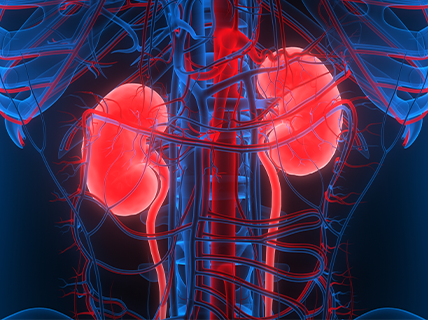Immunoglobulin A (IgA) nephropathy is the most common primary type of glomerular disease. Left untreated, it leads to progressively worsening kidney function and risk for kidney failure. Here, Arnold B. Alper, Jr, MD, MPH, associate professor in the Department of Medicine (section of nephrology) at Tulane University School of Medicine, answers questions about the role of immunosuppressive therapies in the evolving treatment algorithm of IgA nephropathy.
Can you provide an update on the current treatment algorithm and the role of immunosuppression in the management of patients with IgA nephropathy?
The treatment paradigm for IgA nephropathy definitely is evolving.[1,2] All patients should be treated with baseline therapy, including renin-angiotensin-aldosterone system (RAAS) blockade — either with an angiotensin-converting enzyme (ACE) inhibitor or angiotensin receptor blocker (ARB) — for 3 or 4 months to see how their proteinuria responds. For IgA nephropathy patients who have residual proteinuria, ≥ 500 mg despite RAAS blockade, many physicians would say the next treatment should be an SGLT2 inhibitor. There certainly is evidence from randomized trials that sodium-glucose cotransporter-2 (SGLT2) inhibitors can decrease proteinuria.[3] We know that decreasing proteinuria in IgA nephropathy can lead to overall better renal outcomes. Many now recommend SGLT2 inhibitors as a second-line therapy before immunosuppression for most patients that require treatment beyond RAAS blockade.
I estimate that about 30% of patients overall will have inadequate response to conservative treatment with RAAS inhibitors with or without SGLT2 inhibition and will require more aggressive therapy with immunosuppression. I think immunosuppression should be considered for patients that need treatment beyond those therapies — patients that still have more than a gram of proteinuria, although some say ≥ 500 mg. In those patients, the immunosuppression is added onto the background supportive care with RAAS inhibition and the SGLT2 inhibitor. You would continue those while you added immunosuppression.
Traditionally, immunosuppression has been in the form of oral glucocorticoids like prednisone. However, in the past 2 years, the FDA has approved targeted-release budesonide, which has good evidence showing benefit.[4,5] The treatment decision for the individual patient, then, is whether they should be treated with prednisone or budesonide. I think the budesonide formulation has the potential advantage of fewer side effects. In the clinical trial, budesonide had less weight gain, less hypertension, and less glucose intolerance than prednisone. In terms of efficacy, I think they seem to be equivalent overall. However, we don't have a head-to-head comparison of budesonide vs prednisone. Also, budesonide is more expensive, and you have to take that and insurance coverage into account.
You mentioned that patients with a certain amount of proteinuria could benefit from immunosuppression. Are there any other patients that might fit into that category?
There is a small subset of IgA nephropathy patients that present with a rapidly progressive glomerulonephritis. On biopsy, you may have extensive glomerular crescents. Any patient with a rapidly progressive form of IgA nephropathy, especially with crescentic glomerulonephritis, would definitely benefit from immunosuppression.
Are clinical scores like the MEST-C score useful in assessing treatment response? What measures do you use to assess treatment response?
The MEST-C score can give you prognostic information that is based on a review of the biopsy, which I do in all patients to confirm the diagnosis of IgA nephropathy. But we very rarely do a follow-up biopsy, and therefore that test score is not going to help you in terms of follow-up with the patient.
Instead, estimated glomerular filtration rate (eGFR) and creatinine and proteinuria levels are used to monitor how a patient is responding to therapy. Once a patient is on immunosuppressive therapy, I would be watching those values to determine whether the immunosuppressant could be stopped. For instance, in the clinical trials, budesonide was used for 9 months. While I would not use it more than 9 months, you potentially could stop it earlier. I think most people would do immunosuppression for 6-9 months in general.
What I look for is a reduction in those values. If the proteinuria reaches goal, I could consider weaning the patient off immunosuppression. At that point, we're hopeful for long-term remission. The budesonide study[5] showed that the patients were treated for 9 months and then had an additional 15 months of follow-up. At the 2-year mark they showed that the proteinuria and the eGFR remained stable. The hope is that by treating them for 9 months, you can get them into remission and they will remain in remission as long as they remain on their baseline therapy.
What are some other pharmacologic options emerging for IgA nephropathy?
The other new treatment approved for IgA nephropathy is sparsentan, a dual endothelin angiotensin receptor antagonist, which I think has the potential to change the treatment paradigm again based on the evidence from its 2-year clinical trial.[6] Where exactly it fits in the treatment paradigm is still to be established. For example, whether it would be used before or after an SGLT2 inhibitor remains to be seen.
Sparsentan has the advantage of not suppressing the immune system. However, it has a requirement that patients and physicians be enrolled in a sparsentan risk evaluation and mitigation strategy (REMS) monitoring program because it has the potential for hepatotoxicity and embryo-fetal toxicity.[7] Liver monitoring is required while on sparsentan, and all female patients of childbearing potential must submit to a monthly pregnancy test.
For patients who don't remain in remission, what are the next steps? Do they go back on a steroid? Are there other options?
There are no good guidelines to tell you what to do with those patients. I think a relatively small percentage of patients are going to progress to end-stage renal disease. There is a subset of patients that have failed RAAS blockade, SGLT2 inhibitors, and treatment with prednisone or budesonide and/or sparsentan somewhere there in the mix. For those patients, I think that you could try mycophenolate or a calcineurin inhibitor such as tacrolimus. But there is very little evidence to really guide what the next line of treatment should be.
There are other agents in development. Complement inhibitors are being studied because the complement pathway is thought to play a role in the pathophysiology of IgA nephropathy as well as other glomerular conditions. These include avacopan, a C5a receptor inhibitor, which is FDA approved in a type of vasculitis; and iptacopan, a complement factor B inhibitor, currently approved for paroxysmal nocturnal hemoglobinuria. Ravulizumab, a terminal complement pathway inhibitor; and narsoplimab, a MASP inhibitor, are other complement inhibitors being studied.
Sibeprenlimab, which targets an immune cell growth factor (APRIL), also was effective in a phase 2 study.[8] B-cell inhibitors, including rituximab, are definitely something being looked at as well. And there are drugs used in other illnesses, like the myeloma drug bortezomib, being studied in IgA nephropathy now. Assuming that some or all of these medicines work out, it is definitely going to give us a lot more options for the patients that do need the most aggressive therapy and opportunities to individualize their treatment.
Editor's Note: This article was created using several editorial tools, including AI, as part of the process. Human editors reviewed this content before publication.
Credits:
Lead Image: Stone/Getty Images
Image 1: Arnold B. Alper, Jr, MD, MPH
Medscape Nephrology © 2024 WebMD, LLC
Any views expressed above are the author's own and do not necessarily reflect the views of WebMD or Medscape.
Cite this: Q&A: Immunosuppressive Therapy in Immunoglobulin A Nephropathy - Medscape - Apr 05, 2024.













Comments